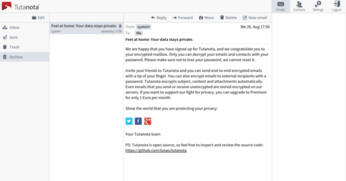Tutanota: A Promising Privacy-Focused Email Service

Productivity Sauce
Despite its somewhat silly-sounding name, Tutanota is a serious open source email service and software that shows a lot of promise. In addition to keeping all your emails and contacts encrypted, Tutanota also provides a relatively easy way to exchange encrypted emails with your contacts. When you add a contact to your Tutanota address book, you have an option to specify a password you and your contact agreed upon. This password is then used to encrypt and decrypt correspondence between you and the contact. This approach greatly simplifies the end-to-end encryption system, although it does have a couple of drawbacks. Firstly, you need to agree on a password in advance and do it preferably through other channels than email. And this system works only if users on both ends use Tutanota.
Even if encryption is not high on your list, you might appreciate Tutanota's simple and user-friendly web interface and the accompanying Android client app. The service is not overloaded with functionality, and some crucial features are still missing (most notably support for drafts, identities and filters). Still, the web interface is a pleasure to use and so is the Android app. The basic Tutanota plan is free, and it gives you a single email address and 1GB of storage. When creating an account you can choose between different domains, such as tuta.io, tutanota.de, and keemail.me. The Premium plan costs only €1.20/month (or €12/year), and allows you to add up to five email aliases and use Tutanota with your own domain. Soon you should be able to purchase additional storage space, too.
Obviously, Tutanota is still at the very early stages of development, and there is still a lot to be done before the service can compete with Gmail FastMail and other established email providers. But if the current version of Tutanota is anything to go by, this project is off to a good start.
comments powered by DisqusSubscribe to our Linux Newsletters
Find Linux and Open Source Jobs
Subscribe to our ADMIN Newsletters
Support Our Work
Linux Magazine content is made possible with support from readers like you. Please consider contributing when you’ve found an article to be beneficial.

News
-
Linux Mint 22.3 Now Available with New Tools
Linux Mint 22.3 has been released with a pair of new tools for system admins and some pretty cool new features.
-
New Linux Malware Targets Cloud-Based Linux Installations
VoidLink, a new Linux malware, should be of real concern because of its stealth and customization.
-
Say Goodbye to Middle-Mouse Paste
Both Gnome and Firefox have proposed getting rid of a long-time favorite Linux feature.
-
Manjaro 26.0 Primary Desktop Environments Default to Wayland
If you want to stick with X.Org, you'll be limited to the desktop environments you can choose.
-
Mozilla Plans to AI-ify Firefox
With a new CEO in control, Mozilla is doubling down on a strategy of trust, all the while leaning into AI.
-
Gnome Says No to AI-Generated Extensions
If you're a developer wanting to create a new Gnome extension, you'd best set aside that AI code generator, because the extension team will have none of that.
-
Parrot OS Switches to KDE Plasma Desktop
Yet another distro is making the move to the KDE Plasma desktop.
-
TUXEDO Announces Gemini 17
TUXEDO Computers has released the fourth generation of its Gemini laptop with plenty of updates.
-
Two New Distros Adopt Enlightenment
MX Moksha and AV Linux 25 join ranks with Bodhi Linux and embrace the Enlightenment desktop.
-
Solus Linux 4.8 Removes Python 2
Solus Linux 4.8 has been released with the latest Linux kernel, updated desktops, and a key removal.

